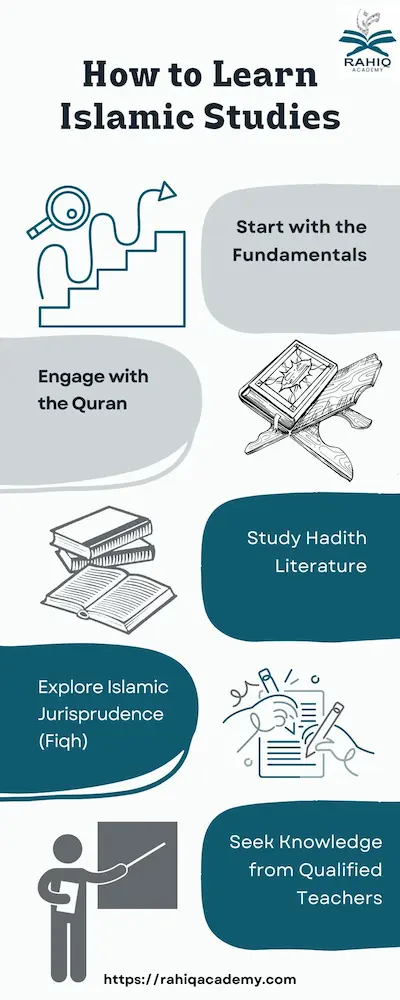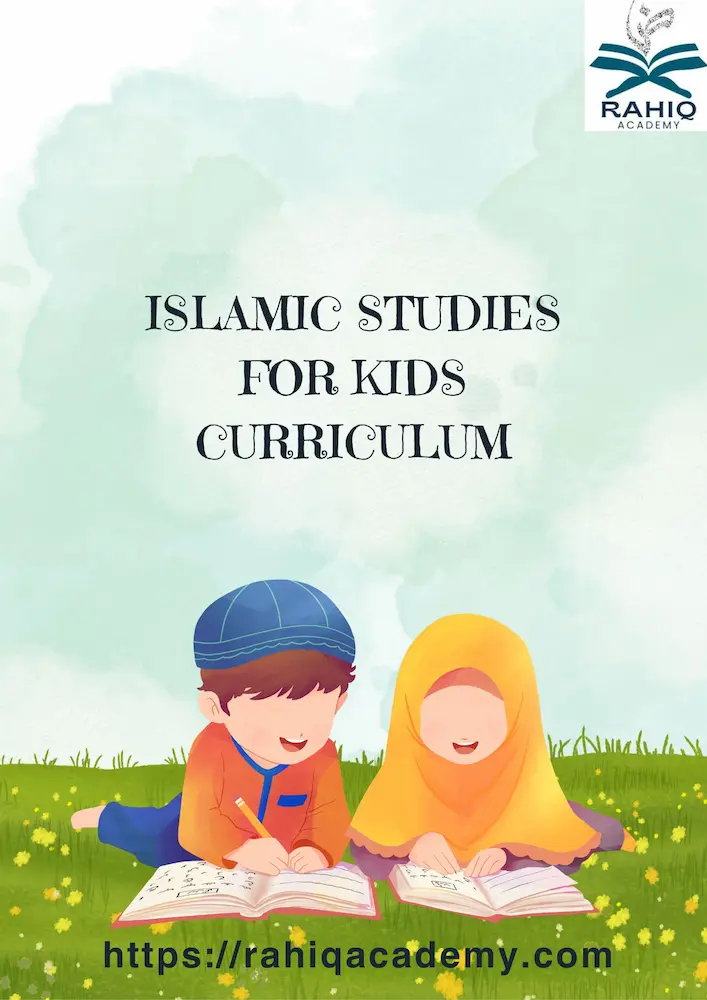Islam, as one of the world’s major religions, offers a profound tapestry of knowledge, wisdom, and guidance for its followers. For those seeking to deepen their understanding of this faith, finding the best way to study Islam is crucial. This comprehensive guide aims to provide you with effective strategies and resources to embark on your journey of Islamic learning, whether you’re a new Muslim, a lifelong practitioner looking to enhance your knowledge, or someone curious about the faith.
The Importance of Arabic in Islamic Studies
As Allah (SWT) says in the Quran:
يَرْفَعِ اللَّهُ الَّذِينَ آمَنُوا مِنكُمْ وَالَّذِينَ أُوتُوا الْعِلْمَ دَرَجَاتٍ ۚ وَاللَّهُ بِمَا تَعْمَلُونَ خَبِيرٌ
“Allah will raise those who have believed among you and those who were given knowledge, by degrees. And Allah is Aware of what you do.” (Quran 58:11)
This verse emphasizes the importance of seeking knowledge in Islam, encouraging believers to constantly strive for deeper understanding of their faith.

One of the fundamental aspects of studying Islam effectively is understanding the significance of the Arabic language. Arabic holds a unique and central position in Islamic studies for several reasons
Here’s the resones of importance of Arabic in Islamic studies:
- Language of Divine Revelation: The Quran was revealed in Arabic, allowing direct access to the original text and preserving its linguistic nuances.
- Preservation of Authenticity: Studying Arabic helps maintain the authenticity of Islamic knowledge and reduces the risk of misinterpretation.
- Enhanced Understanding of Islamic Concepts: Many Islamic terms are deeply rooted in Arabic, providing a more comprehensive grasp of Islamic principles.
- Access to Classical Islamic Literature: A vast body of Islamic scholarship is primarily in Arabic, opening doors to a rich literary heritage.
The Prophet Muhammad (peace be upon him) said:
“تَعَلَّمُوا الْعَرَبِيَّةَ فَإِنَّهَا مِنْ دِينِكُمْ”
“Learn Arabic for it is part of your religion.”
(Reported by Ibn Taymiyyah in Iqtidaa’ as-Siraat al-Mustaqeem)
How to Learn Islamic Studies

To learn Islamic studies you must follow these tips:
- Start with the Fundamentals
- Begin with the basics of Islamic belief (Aqeedah), including the six articles of faith.
- Study the five pillars of Islam and their significance in a Muslim’s life.
- Engage with the Quran
- Start with a reliable translation if you’re not proficient in Arabic.
- Gradually incorporate Arabic study to understand the Quran in its original language.
- Study Hadith Literature
- Begin with famous collections like Sahih Al-Bukhari and Sahih Muslim.
- Learn the basics of Hadith sciences to understand how traditions are authenticated.
- Explore Islamic Jurisprudence (Fiqh)
- Study the basics of Islamic law and its applications in daily life.
- Understand the different schools of thought in Islamic jurisprudence.
- Seek Knowledge from Qualified Teachers
- Attend classes at local mosques or Islamic centers.
- Consider enrolling in formal Islamic studies programs, such as those offered by RAHIQ Academy, which provides excellent Islamic studies courses for kids and adults alike.
The Prophet Muhammad (peace be upon him) emphasized the importance of seeking knowledge:
“طَلَبُ الْعِلْمِ فَرِيضَةٌ عَلَى كُلِّ مُسْلِمٍ”
“Seeking knowledge is an obligation upon every Muslim.” (Sunan Ibn Majah)
The best books in Islamic studies
A crucial aspect of learning Islamic studies is engaging with high-quality literature. Here’s a curated list of some of the best books in Islamic studies
- The Qur’an: Begin with a reliable translation and commentary (tafsir).
- Hadith Collections: “Sahih Al-Bukhari” and “Sahih Muslim”
- “The Sealed Nectar” by Safiur-Rahman Al-Mubarakpuri – A comprehensive biography of Prophet Muhammad (peace be upon him)
- “In the Footsteps of the Prophet” by Tariq Ramadan
- “Purification of the Heart” by Hamza Yusuf
Islamic studies for kids curriculum

Introducing children to Islamic studies from an early age is crucial for building a strong foundation in faith and values. Here’s a guide to developing an effective Islamic studies for kids curriculum:
- Quranic Studies
- Basic Arabic alphabet and pronunciation
- Memorization of short surahs and essential duas
- Islamic Beliefs (Aqeedah)
- Introduction to Allah and His attributes
- Understanding the concept of prophethood
- Prophet’s Life (Seerah)
- Stories from the life of Prophet Muhammad (peace be upon him)
- Islamic Manners and Character (Akhlaq)
- Importance of good behavior
- Respect for parents, elders, and teachers
For a comprehensive and structured Islamic studies program for children, consider enrolling in RAHIQ Academy’s Islamic Studies for Kids Course. Their curriculum is designed to nurture a love for Islam while providing a solid foundation in Islamic knowledge.
Conclusion
Studying Islam is a lifelong journey that requires dedication, patience, and the right approach. By following the principles and resources outlined in this guide, you’ll be well-equipped to embark on a fulfilling and enriching journey of Islamic learning. Remember, the goal is not just to accumulate information, but to gain wisdom that transforms your understanding and strengthens your faith.
As you progress in your studies, consider supplementing your learning with structured courses from reputable institutions like RAHIQ Academy, which offers comprehensive Islamic education for various age groups and levels of expertise.
May Allah (SWT) grant us all beneficial knowledge and guide us on the straight path. As the Quran reminds us:
رَبِّ زِدْنِي عِلْمًا
“My Lord, increase me in knowledge.” (Quran 20:114)




